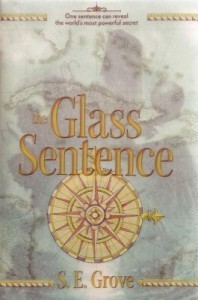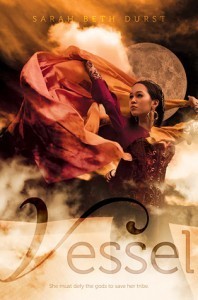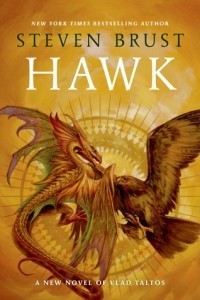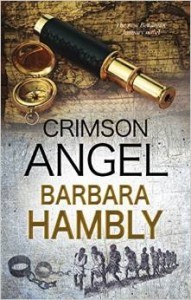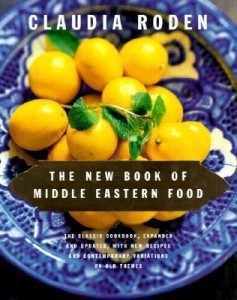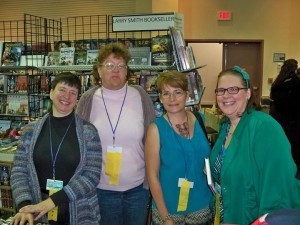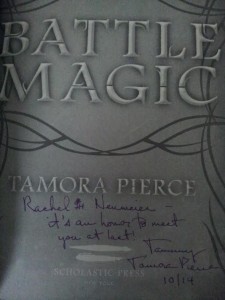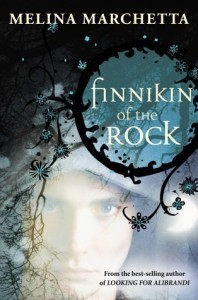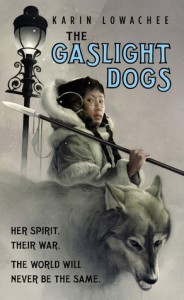Rachel Neumeier's Blog, page 360
October 9, 2014
Recent Reading: Still whittling down the physical TBR pile
First:
Beautiful cover. Great description, too: Boston, 1891. Sophia Tims comes from a family of explorers and cartologers who, for generations, have been traveling and mapping the New World—a world changed by the Great Disruption of 1799, when all the continents were flung into different time periods. Eight years ago, her parents left her with her uncle Shadrack, the foremost cartologer in Boston, and went on an urgent mission. They never returned. Life with her brilliant, absent-minded, adored uncle has taught Sophia to take care of herself. …. Then Shadrack is kidnapped.
However, I found the execution disappointing. There was no feel that the world had been fractured by having different times crash into one another. Instead, this world felt as though different magical fantasy realms had intermingled.
People with wings that are really leaves? With orchid roots growing on their heads instead of hair? With iron teeth?
Faceless weeping spirits that haunt people and drive them to despair?
Onions that are really maps you peel to see the way to your destination?
Maps that are made by putting together eyewitness accounts and creating an overall memory of a place or event?
Don’t tell me all this comes from the distant future. Don’t even bother. It is reasonless fantasy magic. This was a great disappointment to me, since I really looked forward to the interweaving of different historical periods.
The world doesn’t make sense on its own terms, either. How can you have three wealthy cities in a land where everything around the cities is stricken by poverty, as in the Baldlands? How exactly do those cities maintain their wealth? Not by trade. Or by growing or making anything. Magic prosperity!
For me, the writing was not catchy enough nor the characters engaging enough to carry this story. It’s on the giveaway pile, despite that cover.
So, next:
Another beautiful cover!
I enjoyed VESSEL far more than THE GLASS SENTENCE.
Liyana has trained her entire life to be the vessel of a goddess. She will dance and summon her tribe’s deity, who will inhabit Liyana’s body and use magic to bring rain to the desert. But when the dance ends, Liyana is still there. Her tribe is furious–and sure that it is Liyana’s fault. Abandoned by her tribe, Liyana expects to die in the desert. Until a boy walks out of the dust in search of her.
Korbyn is a god inside his vessel, and a trickster god at that. He tells Liyana that five other gods are missing, and they set off across the desert in search of the other vessels. The desert tribes cannot survive without the magic of their gods. But the journey is dangerous, even with a god’s help. And not everyone is willing to believe the trickster god’s tale.
This story read a bit young to me, and a bit slow. It seemed to take forever to get all the “vessels” together and go on with the rest of the story. On the other hand, I did not really get impatient, because the reading experience was a pleasure. I loved all the tiny little stories woven by all the broader narrative: The moon admired her reflection in the sea, and so she . . . A god once entered the wrong vessel by mistake, and he . . . Once upon a time when the world was young . . .
All the characters tell stories to one another. When Liyana walks into the enemy camp and demands to be taken before the emperor? Yep, she opens by telling him a story. This works beautifully.
I liked Liyana, who might have suffered from doubts and fears, but was also decisive and practical — qualities I love in a character. I liked how all the other vessels were annoying to start with, but wound up as people you could root for. I liked the interplay between Liyana and her goddess, Bayla. I liked the emperor, though he might have been a bit good to be true. Oh, and I enjoyed the world, which was not an alternate anything — I sort of thought it was going to be an alternate Mideast kind of thing, but no. It was a purely secondary-world desert setting. I loved the sand wolves!
In fact, I really enjoyed the whole thing, and though this wasn’t my favorite book of the year, I will be keeping an eye out for Durst’s other books. I would say that to me it seemed more MG than YA, so I would suggest approaching it as MG or young YA. That might put your expectations in line with this story and tend to let you enjoy it more. There is plenty to enjoy.
If you’ve read it, I’m curious: do you also feel this was on the young side for YA? What did you think overall?
October 8, 2014
The World is a Fantasy Novel
Yes, another collection of amazing pictures from Twitter, presented as evidence that we are really living in a fantasy novel:
I’m sure the sun doesn’t shine through this rock on just on any common dawn. No, once every hundred years, the sun rises at exactly the right angle.
Then, if you’re standing at exactly the right spot on this beach, the light illuminates letters in a forgotten tongue, carved deep into the cliff behind you. The letters begin to glow until it seems they are filled with fire.
With your long training in the mystical arts — or your gift of tongues — you can read the words carved there. As you read them, they reveal at last the prophecy that unlocks the central mystery of the story and enables you to fulfill your quest and save the world.
What does it mean when the butterflies gather like this? Don’t trouble to describe the seasons or mention ecology: I will tell you what it means.
This tree is not just any tree. It is the source of a special fountain of magic, which has poured itself out into these butterflies, called here to this place for just this purpose. In a moment, the butterflies will scatter on the wind, carrying dreams and portents on their sapphire wings.
When one of these butterflies lights on your hand, you’ll be swept up in a memory of a long-past age. All images and emotions, this memory will not be clear. But it will offer you a tantalizing hint to follow on your journey, during which you are certain to meet others touched by butterfly dreams.
These trees could be Japanese maples, as the caption said on Twitter. But I suspect they are related to mallorns. As those leaves fall, the world is paved and framed and roofed in carnelian light. Walking through this grove of trees might very well carry you to another world, one of high magic and — perhaps — terrible danger.
Perhaps elves walk in the shadows of this red wood; when you turn around the curve of the path, you’ll see the greater trees beyond, with delicate bridges and towers built into the graceful heights of the forest.
Or perhaps as you approach you’ll find that these are not natural trees at all. Perhaps the leaves are indeed each carved of carnelian, and make a sound like ten thousand chimes with every breeze. You won’t know until you walk beneath their shade.
I’m pretty sure this is the great lake up in the mountains of Casmantium, from the shore of which Gereint and Tehre built the Wall between the lands of men and the country of fire.
Or it could be the Lake of Dreams, with water that is not exactly water and Luth’s hall lying just out of sight.
There are so many enchanted lakes. I’m sure this is one. Aren’t you?
Recent reading: Wow, a lot of good books hit the shelves recently
So, at Archon, I picked up a good handful of books that I’d been looking forward to, including:
Okay, HAWK was great, if you’re following the Taltos books. It’s Vlad in top form, back at home, running a caper that really matters — that is, he is planning to get out from under the Jhereg sentence of death or die trying. Things that might annoy you: Brust hides a lot of details about what Vlad is planning from the reader. Why this didn’t annoy me: Vlad himself is pretty much not sharing those details with anybody. Plus, Brust just does this better than basically anybody else. Other writers sometimes hide things from the reader because they’re trying to cheat. Brust hides the details of Vlad’s plan because he’s enjoying himself working out this fancy caper and he wants the reader to enjoy it, too.
Also, the part Vlad explains to people (and therefore Brust explains to the reader) — well, all the way through, I was thinking: REALLY? THIS IS YOUR PLAN? CAN THIS ACTUALLY WORK? And the answer is, No, actually, Vlad is pulling a fast one, and yes, you can tell if you are paying attention. It was fun to watch everything come together. And I like the ending. Which is a bit of a cliffhanger, actually; not in a dreadful way, but I am definitely looking forward to the next book.
Next:
Wow, this was a lot of fun! I really enjoyed it! It does not have the sort of strained plot of the last one, where the authors suddenly make up Panacea as a plot device and an excuse to send Kate and Curren et al to another country for reasons that seem, well, like the authors were pretty much making things up as they went along.
No, in this one, which ties up the primary arc, everything has to do with that primary arc. Which ends in a somewhat predictable but satisfying manner, btw. I mean, it would have been really difficult to pull off a tremendous surprise, after setting things up as they have.
Curren was off-stage for most of the story, and I missed him! Naturally I expected a dramatic appearance later in the book, and I wasn’t disappointed. I really loved how the authors showed the deep, trusting relationship between Kate and Curren in this book. They worked hard to get to this point and I’m glad they’re solid. The one thing that didn’t ring true for me, in fact, was Kate’s hesitation in believing that Curren would choose her over everything else.
Oh, and it was completely obvious who the traitor was.
Basically, though this was a great story and I’m already looking forward to re-reading it. Plus, the authors will definitely be writing at least three more books in this series, moving on past the end of this plot arc. Which is great news, since this is probably my favorite UF series now.
And next:
This has been a good addition to the Benjamen January series, which is my favorite mystery series. The situation, in which Benjamen and Rose are forced to travel to Haiti because of this and that, is pretty believable. The mystery they have to solve in order to deal with their unknown enemy is . . . well, its solution seems extremely obvious just now, but I am about forty pages from the end, so I’m very very sure, but I might be wrong.
What makes this series is the detail work with the setting and the fine characterization. Hambly has done a great job setting Ben up so that he had to choose whether to go after Hannibal or Rose. I would be astonished if any important character actually dies, so I expect this situation will be resolved without that.
I would say that this particular story shows Hambly’s fantasy background, because the voodoo elements — which I really enjoy — are handled in a fantasy manner here, not in a magical realism or realistic way. Besides, in this one, we really need the voodoo stuff to make it possible for Ben to pull everything together.
There’s a lot to be said for stepping into a familiar series. This has been a wonderful reading week, even though my plan to re-read RANGE OF GHOSTS got postponed.
What have you all been reading lately? Anything that was particularly fun or especially satisfying?
.
October 7, 2014
Hot Chocolate Day
So who decides if and when and whether there is a Hot Chocolate Day? I’m too lazy to even bother googling it, and anyway, I don’t really care, because who needs an excuse to make hot chocolate on October 7th anyway? It’s cloudy and cool out; that’s enough justification.
If you feel the same way, then here is Stephanie Burgess’ post about Hot Chocolate Day, with recipes. By an amazing coincidence, her favorite recipe for hot chocolate is the same as mine: that is, it’s Laura Florand’s, as described in THE CHOCOLATE KISS.
The full recipe is posted at Stephanie’s blog.
All I will tell you here is it involves 8 oz of dark chocolate and 2 C of milk. Those proportions should be enough to indicate the super-unctuous hot chocolate the is the Witch’s Chocolate.
Mmm. Hot chocolate.
My favorite cookbook for this fall: Claudia Roden
So the one cookbook I find myself picking up more than any other right now is:
Really I could just put all my other cookbooks away and just use this one for the next month. It not only has a lot of good recipes, t mixes them up with tons of little notes about the food and — and! — Middle Eastern folktales. A whole lot of “Tales of Goha,” which remind me of stories about Coyote, actually. Also lots of non-Goha stories. “The Hoca as Tamerlaine’s Tax Collector.” “The Feast of Tantalus.”
When’s the last time you saw a cookbook that wove a hundred little folktales, bits of history, and poems in amongst its recipes?
So that’s seriously cool.
But also, THE NEW BOOK OF MIDDLE EASTERN FOOD is unpretentious, easy to use, inviting — all the things where a specialized ethnic-focused cookbook can sometimes fail. (Though I don’t think every cookbook needs to be accessible to everyone; some just aren’t meant for inexperienced or casual cooks.) Anybody can use this cookbook and enjoy it, which is not to say that it doesn’t have its share of recipes calling for odd ingredients or less familiar techniques. This is perfect for me, since in fact I DO have a package of dried barberries in my pantry just now, so I can make the Sweet Jeweled Rice exactly as presented, if I feel like it. Or the Rice with Chicken and Barberries. (I did make that latter recipe; I still have plenty of barberries to make the former.)
Barberries are quite tart, by the way. It’s a bit like adding bits of lemon to a recipe, only not really, since barberries don’t have a lemon flavor, exactly, being tart in their own way.
Speaking of lemons, a couple of weeks ago I made preserved lemons, too, so now I am in a good position to make a whole set of recipes, like Chicken With Olives and Preserved Lemon, which is a classic. There are lots of version. I haven’t made the one from this book yet, but now I can. It goes more or less like this:
Djaj Mqualli (Chicken with Preserved Lemon and Olives)
1 chicken (I will use boneless chicken thighs, probably)
3 Tbsp vegetable oil
1 onion, very finely chopped
3 cloves garlic, crushed
1/4 tsp saffron, crushed
3/4 tsp ground ginger
1 1/2 tsp cinnamon (I’m not likely to use this much)
1 preserved lemon (I will probably use half a preserved lemon)
12 cracked green olives (I have some I need to use up)
Put the chicken in a saucepan with all ingredients except lemon and olives. Half cover with water and simmer for 1 1/2 hours, adding water if necessary, until chicken is very tender and the sauce is thick and unctuous. (That is why I will use chicken thighs, not breast; if you’re going to cook chicken for a long time, dark meat is likely to work better.) Now, Roden evidently puts the lemon rind into the dish in large pieces, but here is what I will do: scoop out the flesh of the lemon quarters and throw it away — you always use only the rind of preserved lemons. Rinse the rind. Dice fine. Add to the sauce. Pit the olives and cut in halves or quarters. Add to sauce. Heat through, serve with rice or couscous or whatever you like. Noodles, even.
Preserved lemons are made by quartering lemons and covering them with a brine of salt and lemon juice, incidentally. So they are very, very salty. I would not add salt to this recipe until I added the diced preserved lemon rind and olives.
Anyway, I have some eggplants in the fridge that I need to use for something, and the last medium hot chilies, so tonight I will be looking through this book for something good to make.
October 6, 2014
Archon: Good, with sparkling moments of wonderful
So, I was at Archon this past weekend. That’s a quite small SFF convention right outside St Louis, so it’s an hour and a half drive for me, so I usually go. One of the things that Archon is really known for is a wonderful masquerade, btw, which unfortunately I did not get a chance to see this year. (This really was unfortunate, as I hear the masquerade was exceptional this year.)
Anyway, I had a chance to chat with various local authors:
This is me (obviously); Marella Sands, who did my favorite panel of the weekend on “Good and Evil in The Lord of the Rings” and who has written a couple of fantasies with an anthropological focus; Rett McPherson, who writes mysteries; and Kasey MacKenzie, who has written several books in a UF series. Her first books got a starred review from Publisher’s Weekly, incidentally.
I haven’t read any books by any of these women, but I’m pretty likely to after meeting them all. They all seem like great people and did I mention I especially loved that Tolkien panel?
Anyway, I enjoyed talking to everyone. Plus, I was on a panel on writing YA, pretty standard but it’s always a good topic and always seems to be of general interest. I mean, generally that kind of panel focuses on what sets YA apart from adult and that is always a good way to get a discussion going.
And I was on an interesting panel on “changing voices in SF,” which was good, but hard to summarize.
And one more on “person and voice,” which was especially good because I have strong opinions on why first person is harder than third person and a writer just has to be better to pull that off, plus examples of especially good first person are easy to think of. Fundamentally, I think it’s important to just notice especially well-done and rather awkwardly done examples of first and third person and figure out what’s going on that makes them work or not work. Oh, and I used Judith Merkle Riley as an example of complex point-of-view that really works, though naturally I couldn’t remember her name — why does that always happen? — but at least I remembered the title In Pursuit of the Green Lion so I could point attendees to this great series. (My review here, btw)
So, that was all good.
But!
Tamora Pierce was the guest of honor this year. And I bumped into her because I was chatting with a few people outside the room where she was going to have a panel. And she looked at my nametag, looked at me, and said, “I’m a big fan of your books.”
Okay! After a stunned pause, I asked rather cautiously, “Um, which one have you read?”
And she said, “All of them,” and then we had a brief conversation about Lady Tehre from BURNING SANDS and, well, you can imagine. Luckily I was able to sound really sincere as I told her how much I loved the BEKA COOPER trilogy, how wonderfully she used the journal style for these books, how great the slang was at lending the whole world a sense of depth and reality, etc.
I’ve read all the books set in the Alanna world, and I enjoyed them, but truly the Beka Cooper ones are my favorites by a mile. In fact, I went home and re-read the first Beka Cooper story that night. And yes, it’s just as good as I remembered.
So naturally the next day I picked up her latest book in the dealer’s room. I don’t know anything about it except it’s by Tamora Pierce, it’s probably military fantasy (judging by the name), and it was an appropriate book to ask her to sign.
So then the next day I made sure I had a chance to ask her to sign it for me:
Can you read that?
“It’s an honor to meet you at last.”
Wow. How cool is that?
October 2, 2014
A post with a certain resonance just at the moment –
Janet Reid had a question today that hit me as particularly, painfully ill-informed:
I’ve conquered the query hurdle and secured representation only to find that being on submission is ten times worse! After years of hard work, research, diligence, and above all, patience, I have to think there must be a better way for writers to find publishers that would be less frustrating and more transparent. It feels like the open waters out there and lots of talented writers are getting eaten alive! You’ve been very disparaging of some of the referral services that have popped up, perhaps rightfully so, but it seems to me that a service like Submittable could eventually replace the job of an agent.
So my question to you is, do you think the current agenting model is the pinnacle of publishing or is there a better way? What would that way look like?
I both winced and laughed. (Probably Janet Reid winced and gnashed her sharp shark teeth.)
What she actually said was: You’ll pardon me please if I get a little hot under the collar about the idea that you think I can be replaced by an Excel spread sheet. For starters, even asking the question tells me you don’t have a clue what an agent really does. The question implies that all we do is send manuscripts and wait for replies.
And then she goes on to list other stuff she does.
Well, this whole year I have been VERY cognizant of the cool stuff MY agent does for me, and let me tell you, Janet’s 20-point list is not even complete.
Not all agents do a lot (or any) editing when you send them a manuscript, but that is something I value very highly. Patricia Wrede specifically mentioned that she does not want her agent to act as an editor and I thought, REALLY? Because that seems very strange to me. I want my manuscripts to be as good as possible before my editors see them and most of the time my agent’s suggestions are dead right. But fine, fine, whatever floats your boat. Even then, though, your agent does more stuff than Janet mentioned — specifically all the back-and-forth negotiation on contracts. Yes, I do read contracts myself, and I read them carefully, but I am SO GLAD I do not have to do any of the actual negotiation myself.
If you’re a writer, do you need an agent? No, if you’re self-publishing, though you sure do need a couple of really good beta readers. But YES, IF YOU ARE NEGOTIATING CONTRACT TERMS WITH PUBLISHERS.
Okay, fine, I’m sure someone somewhere has done great working with publishers without an agent, because every probability curve has a far end. But basically, Janet is dead right. Your agent does all the stuff she says plus more.
She’s also right that the submissions process ought to be transparent. I hate to think of anybody being unable to pry information out of their “agent.” I can’t imagine a real agent would not provide submissions information at the drop of a pin.
October 1, 2014
Recent Reading: Dark dark dark, but not grimdark
Oh My God The Backstory Is Grim. Bad stuff happened ten years ago and then it got worse. Widespread starvation, torture, rape, murder, attempted genocide, you name it. Plus it turns out one of the important characters has been psychically tuned in to every bit of the awful stuff that has been happening to her people for all that time. Imagine what that would be like. Except no, don’t, run screaming from trying to imagine that.
Even so, this book is not grimdark, and here is why:
a) At the end, Lumatere is opened up to the world, its people are reunited, and the long process of recovery and rebuilding is underway.
b) There is really no doubt at any time that all of this will come to pass.
c) At the end, every important character is better off. Finnikin accepts the possibility of restoring Lumatere and becomes the leader his people need. Finnikin’s father hauls himself out of despair and takes an active role in restoring Lumatere. Evanjalin grows into her potential. Froi, who starts as a nasty young street thug brutalized by his horrible childhood, becomes a decent person.
d) At the end, the oppressors are thrown down and get what they deserve.
None of those things would happen in a Grimdark fantasy. I keep using Abercrombe as an example, but let me pick something different this time:
Horribleness is not as overwhelming in the backstory, and the world is not filled with unrelenting awfulness as the story unfolds. Sjenn is an interesting character, but I remember almost nothing about her, so there’s that. More important, what makes this story Grimdark is that at the beginning, no one is at a better place than he or she started. Worse, Jarrett, one of the two protagonists, is passive, ineffectual, and callous. At the end, he is evil. As far as I’m concerned, that character arc defines Grimdark.
Ugh.
However, what I find reading Marchetta’s extremely dark fantasy is that the emotional distance I have to maintain in order to bear reading it inevitably produces a lack of emotional engagement with the story and the characters. Unlike Grimdark, it’s readable and even enjoyable, but it’s not the kind of story where I feel drawn in. I don’t find it compelling.
I do like the second book, FROI OF THE EXILES, better, because both Froi and Quintana are more interesting to me than the protagonists of the first book and even more because the overall situation, while difficult and even tragic (for Quintana particularly), is not simply dripping with despair like the situation presented in the first book. But I find myself skipping the plotlines that don’t directly involve Froi and Quintana because I am not engaged enough with the story to really care about the other characters. I sometimes skim, because I’m interested in what will happen, but not sufficiently drawn in to really care that much about how we’ll get to the next important moment.
So, yeah, I’ll finish FROI. I may even read the third book, QUINTANA. But this won’t be a trilogy I come back to again and again.
September 30, 2014
Resources for writers
Okay, first, a day or so ago Martha Wells mentioned she has this page on Twitter, and I went and looked at it and I think it is helpful. It’s a bunch of links to posts that ought to be useful for new writers. If you go to her website, you can get to this page by clicking on “Resources” over on the sidebar, but I thought I would provide the direct link here.
One of my personal favorites is “Being good can be a shortcut. There is no shortcut to being good” by Scott Lynch. I will say that I do not get approached by people wanting The Secret Handshake all that often, but it does happen. I like snarky posts, so I enjoyed Scott Lynch’s post.
And it’s too bad I didn’t know about Jim Hines’ First Novel Survey until it was over, because I wouldn’t have minded being a data point. It’s a survey on how over 200 published writers made their first novel sale. I will just add here that 1) I made my first novel sale with zero short fiction credits; 2) I made my first novel sale with zero contacts with agents and editors; and 3) I have never participated in critique groups or writers’ groups. You can add me to all the appropriate categories.
While on the subject of websites that are good resources for writers, another one I really like is Marie Brennen’s website, Swan Tower. If you click under “essays,” you will find many excellent posts on the craft, business, and philosophy of writing. These essays are well worth checking out, though as far as I know Marie does not update them very often. There are really too many good essays to pick out any in particular. I tried just now, but then I gave up. Just click over and scan through the topics yourself.
When people ask me for websites that offer good information for writers, I still recommend Janet Reid’s website, which as you may know is mostly about the query process, but does have posts on other topics fairly frequently.
For information about one author’s success via self-publishing, I like Lindsay Buroker’s website. She is very upfront about what she has done to promote her books, what pricing strategies she has tried, all that stuff.
I will add, I think posts about How to Write — How to do worldbuilding, how to create strong characters, how to plot, all that — are essentially useless. It is mildly interesting to hear about how someone else does it, but everyone is so different, whatever they suggest is not likely to relate in any way to how you personally write. So I have no links to that sort of post. There sure are a lot of such links on Twitter, though, at least if you follow a lot of writers, so I guess many people like writing How to Write posts. Me, I need to start following more dog people or home bakers, because at the moment my twitter stream is a perhaps a little top heavy with writing tweets and book recommendations.
September 29, 2014
Finished!
Always nice to tie up a manuscript and send it off! I always enjoy it as much as possible, since it happens at least twice per book (and sometimes more).
Revising KEHERA was kind of a big job and in fact I thought of a loose end I didn’t tie off properly just a minute ago. I should add a couple sentences. But BASICALLY, it is finished. It will go back to Caitlin for comments. I took a lot of her suggestions but not all; my feeling is the book works pretty well now but may seem a bit choppy toward the end. My feeling is not reliable at this point, though, which is why the manuscript goes back to Caitlin. Very likely I will wind up doing a bit more with it.
But not this week!
My hope right now is to take October off (essentially). I have an awful lot lined up to do, but I am due a month off and I’m taking it.
So, taking time off!
What I REALLY want to read is more Raksura stories, but since I’m out, I will have to read other stuff. Luckily other stuff is not in short supply. Even though I have a lot of titles on my Kindle that I would love to read, I really must read at least half a dozen titles from my physical TBR shelves, because those shelves are overflowing (again).
So now I’m in the middle of FINNIKIN OF THE ROCK. I loved Melina Marchetta’s contemporaries. I know some of you commented that you were not keen on her fantasy, but I’m always interested in exploring an author’s work once I start reading her books. I had trouble getting into each of her contemporary titles, so though FINNIKIN has also been tough to get into, I am going on with it. It’s got a horribly brutal backstory which is definitely causing me to stay a bit distant from the story out of self-protection. Therefore, I’m sort of liking it, but in a distant, more intellectual way. I’m not very emotionally involved. I am pretty sure I will be giving this book away, because I’m pretty sure I will not want to re-read it. But I’m only halfway through the book and it’s possible the ending will be so brilliant it will change my whole perception of the story and make it a keeper.
I’ve also got RANGE OF GHOSTS on my table upstairs. I own the whole trilogy, so unless I change my mind, I will next re-read RANGE OF GHOSTS and then go on with the other two books. There’s plenty of brutality in that one, too, but it’s not the same as the grinding despair that fills FINNIKIN’s backstory.

